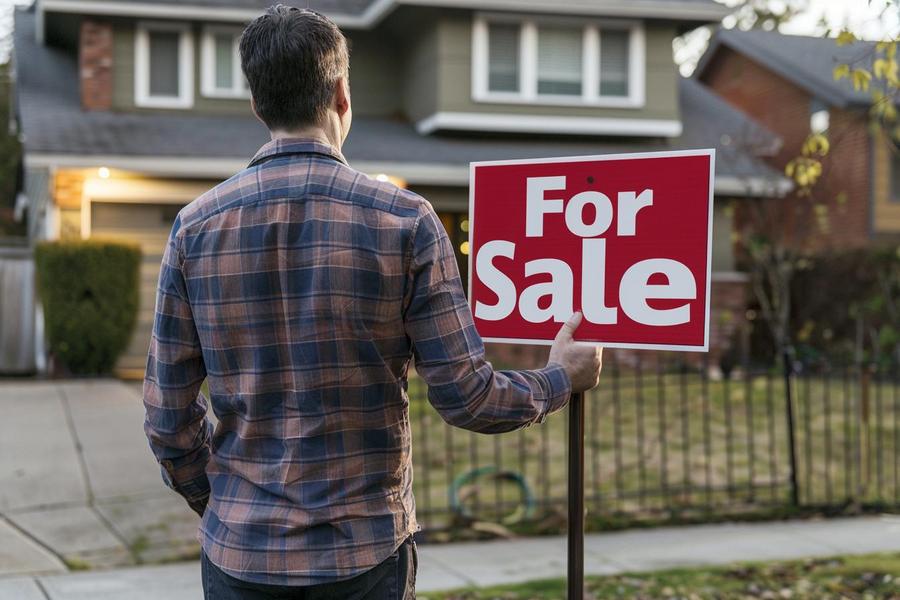Wondering if you can sell your house for less than it's worth? You're not alone. Many think selling a house means getting top dollar. But, life's twists and turns often lead us down different paths. Whether it's a quick sale you need, or you're helping out a family member, selling below market value is a real option. Dive into this guide to learn how, why, and the legal and tax bits you need to know.
TL;DR
- Selling a house below market value is legal, often done for quick sales, to aid family, or due to financial hardships, without tax breaks on losses.
- Appraised, assessed, and market values differ; market value determines selling price.
- Tax implications include inability to deduct loss, potential gift taxes for selling significantly below market value, and fixed closing costs irrespective of sale price.
- Selling to family requires formal appraisal, a below-market price, and proper contracts without expecting tax advantages on the loss.
- Financial and emotional implications include reduced return and possible relationship impacts; still responsible for typical closing costs.
- Alternative fast sale methods like direct sales or auctions exist, possibly avoiding low sale price drawbacks.
- Careful price setting below market value involves appraisals and tax assessments, mindful of not gaining tax deductions for losses.
- Tax considerations: No loss deductions allowed; gift taxes applicable on large undervalue sales; consult tax professionals.
- Real-life cases highlight the necessity of contracts and tax considerations, showcasing benefits and drawbacks.

Can You Sell a House for Less Than It’s Worth?
What Determines a House's Market Value?
Market value shows what buyers will pay for your home. It can differ a lot from both the appraised and assessed values. Appraised value comes from a pro appraiser's view. This number helps buyers get loans. Your local tax assessor sets the assessed value. This one is often less than what you could sell your house for. Each figure gives a way to value your home, but market value ranks top for sale price setting.
Reasons Why You Might Consider Selling Below Market Value
You might sell below market value for a few key reasons. Maybe you wish to help out family or friends. Often, a quick need for cash can lead you to sell for less. Sometimes, if homes like yours don't sell well, setting a lower price might attract buyers. If you owe more than your home's worth or face hard times, a short sale might be your fix. This requires your lender's okay.
When selling to someone close, even at a discount, do so smartly. Sort a contract first. Understand any taxes this deal might draw. OnPropertyChanged, pricing low to end fast can pull in buyers quick.
Selling under market value means you're looking at less profit. You'll still cover typical closing costs. This selling mode won't give tax breaks on any losses, which can be a hard pill to swallow.
In all, dropping below market value is a useful tactic in tight spots. Whether you're easing financial burdens or helping someone close, be sharp about these choices. They shape not only your finances but personal bonds too.
What Are the Tax Implications of Selling a Home Below Fair Market Value?
When you sell your house below market value, you face some tax issues. First, you can't claim a loss on your taxes for selling low. This might seem unfair, but those are the rules.
Understanding Capital Gains Tax When Selling Below Market Value
You usually pay capital gains tax when you sell a property for more than you bought it for. But if you sell your home for less than the fair market value, capital gains tax usually doesn’t apply. Yet, this can vary based on how much lower you sell and your particular tax situation.
Gift Taxes and Selling Your House Below Its Market Value
Also, think about gift taxes. If you sell your home very cheap to someone like a family friend, the IRS might see this as giving a gift. The difference between the home's market value and the sale price could be seen as a gift value. You might owe gift taxes on this amount.
Selling below market value can mean you are being generous, or maybe you need a quick sale. Whatever the reason, know these tax rules—this helps you not get surprised by a tax bill. Always check with a tax professional. They can give advice tailored to your specific situation. You might also consider gaining further insights from resources explaining the tax implications of selling a house below market value. This way, you ensure you handle things correctly and avoid any unexpected financial burdens.
Related Links:

Is Selling Your House Below Market Value Legal?
Legal Considerations When Selling a House Below Market Value
Can you sell your house for less than it's worth? Yes, it's legal. Selling a house below market value is not illegal. Contracts must meet legal standards, though. This ensures the deal is fair and clear to all involved.
When you sell your home for less than market value, why is it okay? Simple: both buyer and seller agree to the terms. So, the law sees this agreement as valid.
Still, you must watch out for a few things. Make sure all contract terms are clear and signed. This way, no one feels cheated later. Also, understand that you as the seller won't get a tax break on any losses from this sale.
People sell their homes for less for many reasons. Sometimes, it's quick cash they need. Other times, they want to help a friend or family member get a home.
Yet, selling low can have its own issues. You might still need to pay usual closing costs. And if not careful about the real value of your home, you might end up at a bigger loss than planned.
With the right knowledge and careful planning, selling below market value can work out well. Just make sure you handle every legal bit correctly. Stick to the rules, consult with a pro if unsure, and your sale should go smoothly.
How to Sell Your House Below Market Value to a Family Member
Steps to Take When Selling to a Relative or Friend
Selling your house below its market value to a family member involves a few key steps. First, get the house appraised to establish its fair market value. You can't just guess the value. You need solid facts. Next, set a price that is fair but below the appraisal. Drawing up a proper contract is key as well. This ensures that both parties know the deal is serious.
When thinking about taxes, remember: selling below the market can't give you tax breaks on the loss. You need to be clear on this to avoid surprises. Also, even with a below-market sale, you handle the usual closing costs. These are legal fees, transfer taxes, and others.
Many decide to sell at a lower price to help a family member start up. This often happens between parents and children or among siblings. While it might be tempting to just hand over the keys, a formal sale process helps avoid future issues.
For a deeper dive into strategies and legal considerations when selling to family, reading up on family-based property transactions can be quite enlightening. This read Selling to a Family Member can provide extra insights and tips to ensure a smooth transaction.
It's worth noting that other factors might tempt you to sell below market value. Maybe the house isn’t doing great on the open market, or perhaps you need a fast sale due to personal reasons. Whatever the case, approaching this with knowledge and proper guidance keeps you on track and protects your interests and those of your family.

What Happens if You Sell a House Below Market Value?
Potential Financial and Emotional Implications
Yes, you can sell a house below market value. Many do this for quick sales or personal reasons. Money-wise, expect less back on your investment. This means less cash after paying off your mortgage or other debts linked to the property. Emotionally, this choice might affect relationships, especially if selling to family or friends. Often, the emotional value can outweigh financial loss.
Market value is what buyers will pay for your home today. You might find, for instance, in bustling urban areas like San Francisco or historical towns like Charleston, that market values hugely vary. An appraiser gives an appraised value. This value might differ as it is a professional estimate.
A tax assessor decides the assessed value. It's often less than what you could get if you sold your home. This value is crucial for property taxes. Selling for less than the market value doesn't allow tax deductions for the loss you take. It's a key point many miss.
Even with lower sale prices, closing costs still apply. These are fees and expenses you need to pay to finalize the sale. Keeping this in mind is important because these costs can sometimes be a surprise at the end.
Selling below market value often happens under special circumstances. These could be selling to someone you know like family or needing a fast sale due to financial bind or the home needing major repairs that you can't handle. Every seller in places like Tulsa or Miami needs to think about these things no matter their situation.
In summary, selling your house for less than its market value comes with both risks and benefits. You'll need to weigh these based on your personal situation, market conditions, and long-term financial plans.
How Does Selling Below Market Value Affect Closing Costs?
Understanding Seller Responsibilities at Closing
Yes, you still pay closing costs even if you sell your home for less. These costs might include title searches, attorney fees, and real estate commissions. In many places, such as Fairfax County, Virginia, or Montgomery County, Maryland, local customs or laws decide who pays what part of these costs.
Selling your house for less than its market value doesn't cut your closing costs. Rather, these costs stay about the same and don't link directly to your home's selling price. For a quick grasp: if typical closing costs are 2% to 5% of the home's price, selling at $150,000 or $200,000 still incurs similar expenses in dollars.
Common reasons like selling quickly or to someone you know don't change these expenses. For example, if you choose to sell your house below market value to speed up the sale or help out a family member in Atlanta, your gesture won't lessen the closing costs. It's vital to budget for these and discuss who covers what early in the selling process.
Understanding this helps you plan better and avoid surprises during the sale. Whether you are in bustling city centers like Chicago or quieter neighborhoods in Omaha, this rule holds. This knowledge ensures you manage your finances well and maintain clarity with your buyer, leading to a smoother transaction.

Strategies for Selling Your House Quickly for Cash
Options Beyond Selling Below Market Value
You can sell your house fast without pricing it too low. Consider direct sales or auctions. Direct sales to a buyer cut out the middleman. This method speeds up the process and often leads to quick cash. Auctions can also help. They create urgency among buyers which can lead to a fast sale.
These options help you avoid the cons of selling below market value. Selling at a low price means you lose some money. You still pay closing costs and can't deduct your loss on taxes. More, if you sell for too little to someone you know, you must follow tax rules.
Each strategy has its setting where it works best. Direct sales are good if you need a guaranteed quick transaction. Auctions are perfect if you think you can spark a bidding war. These methods offer speed in trading your house for cash without significant losses. This approach suits many, especially those facing financial hurdles or bad market conditions.
How to Determine a Fair Sale Price Below Market Value?
Assessing Your Home’s Value and Deciding on a Sale Price
How do you decide on a sale price below market value? First, find the true worth of your home. Use appraisals and local tax assessments to start. From there, you can plan the best sale price. Yes, you can sell your house for less than others. People often do this to speed up the sale. They might also sell for less to help a family member or friend buy their home.
Appraised and assessed values differ in key ways. An appraiser looks at your home details and nearby sale prices to guess its worth. But, your tax assessor will give a value often less than what the market says. Why? Because tax values aim to be fair over time and across many properties. So, they don't swing as wildly as market prices can.
When thinking of a lower sale price, remember a few things. You might sell faster at this price. But you'll still pay regular closing costs. Also, selling for less means no tax breaks on the loss. You need to be okay with that.
So, setting your home price below market involves careful thought. Use both appraisals and tax values as guides. Then, choose a price that reaches your goals, like a quick sale or helping someone special buy your home.
Tax Benefits and Considerations When Selling Below Market Value
When you sell your home for less than its market value, you face both tax risks and benefits. Yes, you can sell at a lower price but must still consider taxes. The market value is what a buyer would pay for your home. It's set by demand in places like Arlington, Denver, or Miami. Appraised value comes from a professional and can differ. Assessed value is always lower, set by local tax rules.
First, you can't deduct any loss from selling under the market price. This means if your home's value drops, yet you sell it for even less, you'll swallow the whole loss. Also, remember closing costs; they stick around even at a lower sale price.
But what about taxes? When selling low, you might trigger gift tax needs if it seems like you're giving away too much value. For example, say you sell your $300,000 home in Boulder for $200,000. The IRS might see that missing $100,000 as a gift. This is extra crucial if you sell to someone close like a family member. Always check tax implications on sales like this here.
Why sell low? Maybe your home won't sell in the current market, or you need a quick exit. Maybe it's a strategic sale to a relative. Either way, always use a proper contract and stay aware of tax laws to avoid surprises. Lastly, if your home has financial issues or if you owe more than its worth, a sale below market might need special lender approval.
In all cases, selling your home under its market value needs careful thought, especially about taxes. Make smart choices based on good info!
Case Examples: Selling a Home Below Market Value
Real-Life Outcomes and Lessons
Yes, you can sell your house below its market value. Many do this in California and elsewhere. Market value is what buyers will pay. Often, this is more than the appraised or assessed values.
Let's delve into why and how folks sell homes for less. Some folks sell below market value to family. It makes passing on property smoother or helps with buying their first home. Even when selling to someone close, always sign a contract. Know the tax laws that apply to avoid surprises.
Sometimes, homes don't do well on the open market. This could be because of wrong pricing or lesser appeal. Setting a lower list price can attract buyers fast, especially if the home needs fixes.
Financial troubles or owning more than the home’s worth (negative equity) might need you to sell quick. In these cases, a short sale could be needed. You'll need okays from lenders for short sales.
However, note that when you sell a home for less than its value, you face some drawbacks:
- You can’t cut your taxes based on this loss.
- You'll still cover closing costs, which doesn't dwindle with the sale price.
From real stories, John in San Diego sold his aging home to his daughter under market value. This helped her to begin her homeowner journey in a tough market. They signed a clear contract and got a tax pro’s advice, making sure no laws were side-stepped.
In another case, Sarah in Los Angeles chose a low listing price for a speedy sale due to a job move. She shared her home online with real-time details, drawing buyers in quickly. Although she sold for less, the quick sale meant she could move on without juggling two mortgages.
These tales show that selling below market value is not only possible but can also be practical depending on your needs and circumstances.
Your Questions Answered: Selling Below Market Value
Common Concerns and Clarifications
Can you sell your house for less than what it's worth? Yes, you can. This may be a good idea in many cases. For example, maybe you want to sell fast or to a friend. The market value of a house is what a buyer will pay. An appraiser gives the appraised value, and it might differ. Your tax area sets the assessed value, usually lower.
When selling your home below market value, know a few key things. First, you can't cut tax bills based on any loss from the sale. Also, even selling at a low price, you still pay closing fees.
People have many reasons to sell below market value. They may want a quick sale, need to ease money stress, or help a relative. Selling quick might bring lots of buyer interest if the house needs fixing. If you owe more than your house's value, you might need to do a short sale. Banks must say yes to this kind of sale.
You always need a contract when selling, even to people you know. This helps avoid tax or legal issues later. Make sure you understand your area's rules on these sales.
In this post, we tackled selling your house for less than it's worth. We covered why and how you might do this, from family sales to quick cash needs. We also looked at legal bits, taxes, and closing costs. Plus, we shared tips for setting a fair price and some real stories. Selling below value can work well with the right steps. It's a handy option when you need a fast, simple sale.











